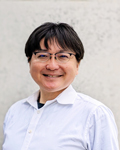- HOME
- Research
- Researcher's Profile
- Kazuyuki YAMAGATA
Researcher's Profile

- Project Lecturer
- Kazuyuki YAMAGATA
- Integrative Nutriomics and Oncology
Biography
| March 2002 | University of Tsukuba, Agrobiological Resource Sciences |
|---|---|
| March 2007 | University of Tsukuba, Graduate School of Life and Environmental Sciences |
| April 2007 | University of Tsukuba, TARA center, Post-doctoral fellow |
| April 2009 | Harvard Medical School/Boston Children's Hospital, post-doctoral fellow |
| June 2014 | Project assistant professor, Doshisha University |
| April 2017 | Project assistant Professor, Graduate School of Pharmaceutical Sciences, Chiba University |
| April 2019 | Project assistant Professor, Graduate School of Medicine, Chiba University |
| October 2019 | Assistant Professor, Graduate School of Medicine, Chiba University |
| April 2025 | Project lecturer, RCAST, UTokyo |
Research Interests
Human embryonic stem (ES) cells and human cancer stem cells share similar characteristics. For example,
1) they are resistant to anti-cancer drugs,
2) they have unlimited proliferative potential, and
3) they highly express pluripotent markers.
I have been involved in research using human ES/iPS cells to investigate the mechanisms of anti-cancer drug resistance. During this research, I happenstantially discovered that human ES/iPS cells undergo abnormal differentiation when treated with anti-cancer drugs. As I explored the mechanism behind this abnormal differentiation, I identified a previously uncharacterized human-specific lncRNA that induces this abnormal differentiation. Furthermore, I was able to demonstrate that this lncRNA plays a role in the acquisition of anti-cancer drug resistance (Nature comm, in press).
In addition to this study, I have long been engaged in research on how gene expression is activated in response to physiological signals. Specifically, I elucidated how bile acids contribute to glucose metabolism (JBC, 279(22):23158, 2004; IJMM, 19(5):751, 2007), how oxidative stress-induced arginine methylation of proteins directly blocks insulin signaling (Molecular Cell, 32(2):221, 2008; PNAS, 108(15):6085, 2011; Cell Metabolism, 13(5):505, 2011), and the role of an uncharacterized domain frequently mutated in leukemia (JB, 161(4):327, 2017). Building on these biochemical, molecular biology, and epigenetic approaches, I aim to develop nucleic acid-based drug seeds targeting intractable and therapy-resistant cancers.
Award
- April 2005 JSPS Research Fellowship for Young Scientists (DC2)
- December 2007 The 2nd JST-ERATO Yamamoto Environmental Response Project International Symposium, Most Impressive Poster Presentation Award
- June 2008 The Naito fundation, Subsidy for Promotion of Specific Research Projects
- February 2009 The Inoue Fondation for Science, Inoue Research Award for Young Scientists
- April 2009 The Uehara Memorial Fondation, Research Fellowship
- April 2010 JSPS Postdoctoral Fellowship for Research Abroad
- January 2011 Human Frontier Science Program, long term fellow
- September 2018 The Journal of Biochemistry, Award for Papers
- April 2025 LSBM_conference 2025 poster award, LSBM conference 2025
Keywords
stem cell, cancer, epigenome, biochemistry, molecular biology

 onc.rcast.u-tokyo.ac.jp
onc.rcast.u-tokyo.ac.jp